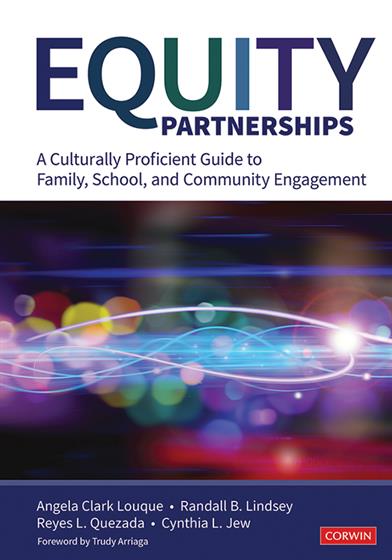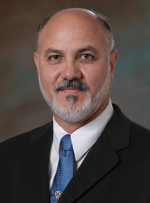
Hands-on, Practical Guidance for Educators
From math,
literacy, equity, multilingual learners, and SEL, to assessment, school counseling,
and education leadership, our books are research-based and authored by experts
on topics most relevant to what educators are facing today.

Equity Partnerships
Foreword by Trudy T. Arriaga

- Grade Level: PreK-12
- ISBN: 9781544324159
- Published By: Corwin
- Year: 2019
- Page Count: 176
- Publication date: September 19, 2019
Price: $32.95
For Instructors
When you select 'request review copy', you will be redirected to Sage Publishing (our parent site) to process your request.
Description
How often do you hear, “The only parents who showed were the parents who didn’t need to be here.”
But how often do you consider time of day, lack of child care, cost of dinner, transportation, language of the presentation, even relevance of the topic—all real-world barriers for families of our historically underserved students.
Here at last is a resource that will open up access and reveal all-new ways to forge more culturally inclusive partnerships with families and communities . . . partnerships that extend well beyond parent-teacher conferences, PTA meetings, and the occasional bake sale.
The two big services Equity Partnerships provides? Using the Tools of Cultural Proficiency, you’ll
- Discover new concepts and strategies to engage families and communities—and reduce, if not eliminate, barriers--through four essential principles: communication, connection, collaboration, and community
- Engage in frequent opportunities to reflect on your own assumptions and values, then collaborate with colleagues to co-create systemic practices and policies for devising, implementing, and assessing family and community engagement actions in your schools and districts
We know inherently that family and community engagement is critical to the success of our students. Let Equity Partnerships be your go-to tool for breaking down the walls that for too long have limited all of us.
“Raising the next generation is a shared responsibility and privilege. These authors have been first responders for decades by promoting Cultural Proficiency as a means to ensure equity and access for all. In Equity Partnerships, they identify the powerful and critical link of family, school, and community engagement to strengthen families, build community support, and increase student success.”
--TRUDY ARRIAGA, Associate Dean for Equity and Outreach, California Lutheran University, and Coauthor of Opening Doors
Author(s)

Angela R. Clark-Louque
Dr. Angela Clark-Louque is Professor and Department Chair of Educational Leadership and Technology at California State University, San Bernardino. She has served in several educational capacities during her career. This year, she was chosen as the Outstanding Faculty in Research and Scholarly Activities and in 2015 she was the Outstanding Faculty in Teaching
At the university level, she has served as an associate dean of academic affairs, director of graduate studies, department chair of doctoral studies, director of educational administration, and director of teacher education. At the community college level, she served as a counselor and mathematics faculty, and at the K-12 level, she served as an administrator and mathematics/social science teacher.
Dr. Clark-Louque continues to teach advanced human resources, qualitative research methods, and leadership courses to aspiring and practicing school leaders. Her research activities include peer-reviewed publications, grants, and reports. She has co-authored a book entitled, “Exposing the ‘Culture of Arrogance’ in the Academy: A Blueprint for Increasing Black Faculty Satisfaction in Higher Education” (2005), and served as the co-editor and editor of the Journal of Urban Learning, Teaching, and Research (2007-2010) through the American Educational Research Association (AERA).
Her qualitative and quantitative research has focused on culturally proficient leadership, African Americans in educational leadership, developing and mentoring culturally proficient school leaders, and parental engagement. In 2010, she graduated from the Thomas Lakin Institute for Mentored Leadership, a national network of African American Community College CEOs. She was appointed the Committee Chair of Political Activism for the NAACP – Southwest Riverside Region and was asked to serve on the Los Angeles Committee of Honor for the Freedom’s Sisters exhibit and tour, which pays homage to a group of extraordinary African-American women who have shaped the spirit and substance of civil rights in America.
Dr. Louque is a native of Memphis, Tenn. and is a graduate of George Washington Carver High School, the University of California, Los Angeles (UCLA), and Loyola Marymount University (LMU). She earned her doctorate in Educational Leadership: Institutional Management from Pepperdine University and has credentials and certifications in teaching: mathematics and social science; and administration: preliminary and professional (Tier I and Tier II).

Randall B. Lindsey
Email – randallblindsey@gmail.com
Website - CCPEP.org
Twitter - @RBLindsey41

Reyes L. Quezada
Dr. Reyes L. Quezada was born in San Juan De Los Lagos, Jalisco, Mexico. His family of 8 immigrated to the United States and settled in Southern California in a farm near the Mexican border by Brawley. He was seven years old. His father was a farmworker and participated in the Bracero Program (Guest worker) in the early 1960’s, his mother was a stay home mom who provided a caring and loving environment for his brothers and sisters. He has been a teacher, community college counselor and teacher educator for the past thirty-eight years, twenty of those years as a professor. He joined the University of San Diego, San Diego California in 1999. He has been a professor at the University of Redlands, and California State University Stanislaus. He holds Community College credentials in Counselor Education, Supervision, Psychology, and a California Multiple-Subjects Bilingual Emphasis Teaching credential-Spanish. His degrees include a Bachelor of Arts from San Jose State University and a Minor in Mexican American Studies, and holds four Advanced Degrees-a Masters degree in Education from the University of San Diego, and a Masters degree from San Diego State University, a post Masters degree-Educational Specialist degree from Point Loma Nazarene College and a doctorate from Northern Arizona University, Flagstaff, Arizona.
Dr. Quezada has presented at international, national, and state conferences (France, Spain, South Africa, Mexico, Costa Rica, Middle East, Italy, England, Colombia, Canada, Hong Kong, Thailand, Cambodia, Philippines, Czech Republic, Greece, Ghana, and in Israel). His teaching, research and publications are on issues of cultural proficiency, equity, international education, diversity, family school and community engagement, bilingual education and migrant education. His publications include four books, twenty journal articles and eleven book chapters. He has edited five themed journals on internationalizing colleges and schools of education for the Catholic Education Journal, Teacher Education Quarterly, and in Teaching Education, as well as on Family, School and Community Engagement and Partnerships in the journals Teaching Education and Multicultural Education.
He is on the board of directors for state, national and international organizations including the national Council of Educator Preparation Programs (CAEP), the American Association for Colleges for Teacher Education (AACTE), and the current Chair of the International Council for the Education of Teachers (ICET). He was the Co-chair of the California Commission on Teacher Credentialing-Committee on Accreditation (COA), and was Associate Editor for Teacher Education Quarterly, and sits on many editorial and review boards including the Annual Editions of Multicultural Education, Teacher Education Quarterly, Issues in Teacher Education, the School Community Journal, the Journal of Hispanics in Higher Education, Educational Research Journal, Teacher Education Quarterly, Horizon, the Journal of International Studies, and Issues in Teacher Education. He was on the San Bernardino County-Third District Supervisor Representative to the Equal Opportunity Commission, and former School Board President and current member for Real Journey Academies Charter School in San Bernardino, California.

Cynthia L. Jew
Cynthia L. Jew, Ph.D. is a professor at California Lutheran University in Thousand Oaks, CA. Dr. Jew teaches in the Counselor Education program focusing on Field Experiences and School Systems as she prepares School Counselors. She is co-author of Culturally Proficient Inquiry: A Lens for Identifying and Examining Education Gaps (Corwin, 2008) and Culturally Proficient schools: All means All. (Corwin 2017) She also serves as a consultant to the Santa Clarita Valley International Charter schools focusing on the areas of Student Support and Inclusiveness. She is a Licensed Psychologist and Certified School Psychologist. She has two daughters, Kiera and Jordyn, who is Deaf and wears Cochlear Implants.
Table of Contents
FOREWORD BY TRUDY T. ARRIAGA
ACKNOWLEDGMENTS
ABOUT THE AUTHORS
Introduction
PART I. THE BASICS OF CULTURAL PROFICIENCY AND ENGAGEMENT
CHAPTER 1. The Cultural Proficiency Framework: Tools for Family, School, and Community Engagement
Overcoming the Barriers to Cultural Proficiency
The Guiding Principles of Cultural Proficiency
The Cultural Proficiency Continuum
The Essential Elements of Cultural Proficiency
The Family, School, and Community Engagement Rubric
Going Deeper Reflection
Going Deeper Dialogic Questions
Summary
Looking Ahead: Chapter 2
CHAPTER 2. The Why of Engagement
Changing Times and Terminology
Informed by Related Studies: From Strain to Inclusion
What Parents Want to Know and What Parents Want Educators to Know
Benefits of Partnering for All
Family and Community Engagement and Link to Student Achievement
Culturally Proficient Leadership and Engagement
A Moral Imperative and Shared Responsibility for Creating Culturally Proficient Engagement
Our Why
Going Deeper Reflection
Going Deeper Dialogic Questions
Summary
Looking Ahead: Chapter 3
CHAPTER 3. The Moral Imperative for Partnerships: Historical, Legal, and Educational Policy Contexts
Family, School, and Community Engagement Has Evolved Over Time
Twentieth Century and Beyond
Federal and State Court Decisions and Legislative Actions That Foster Family, School, and Community Partnerships
Educational Rationale for Family, School, and Community Engagement
Importance of Educational Research in Building Family, School, and Community Engagement in Diverse Communities
Going Deeper Reflection
Going Deeper Dialogic Questions
Summary
Looking Ahead: Chapter 4
PART II. EMBRACING TO ENGAGE
CHAPTER 4. How Cultural Proficiency Intersects With Family Engagement
Alignments
Cultural Proficiency’s Guiding Principles Provide a Moral Base for Essential Elements
Using Our Assets of Moral Authority, Reflection, and Dialogue
Guiding Principles of Cultural Proficiency: Surfacing Our Assumptions, Beliefs, and Values
Being Intentional in Valuing Students’ Cultures as Assets
Valuing Leads to Doing
Constantino’s Five Simple Principles
Dual Capacity-Building Framework
Dialogic Questions
Summary
Looking Ahead: Chapter 5
CHAPTER 5. The 7 Cs of Engagement
Collaboration
Communication
Caring
Culture
Community
Connectedness
Collective Responsibility
Going Deeper Reflection
Going Deeper Dialogic Questions
Courageous Engagement
Summary
Looking Ahead: Chapter 6
PART III. FROM MARGINALIZATION TO INCLUSION
CHAPTER 6. Barriers to Family, School, and Community Engagement
Barriers to Cultural Proficiency
Barriers to Family, School, and Community Engagement
Author’s Analysis
Using the Family, School, and Community Engagement Rubric
Author’s Analysis
Using the Family, School, and Community Engagement Rubric
Author’s Analysis
Using the Family, School, and Community Engagement Rubric
Author’s Analysis
Using the Family, School, and Community Engagement Rubric
Going Deeper Reflection
Going Deeper Dialogic Questions
Summary
Looking Ahead: Chapter 7
CHAPTER 7. The Guiding Principles Foster Essential Elements as Educator and School Action
From Barriers to Constructive Action
Essential Elements
Essential Elements
Essential Elements
Essential Elements
Going Deeper Reflection
Going Deeper Dialogic Questions
Summary
Looking Ahead: Chapter 8
PART IV. COMMIT TO ACTION
CHAPTER 8. The 8th C—Commit to Action
Building Family and Community Capacity
Using Pre-assessments to Get Started
Planning to Plan
From Negative to Constructive
Your Cultural Proficiency Family, School, and Community Engagement Action Plan
Components of a Culturally Proficient Family, School, and Community Engagement Plan
Summary
Looking Ahead: Chapter 9
CHAPTER 9. Resources: Culturally Proficient Planning for Inclusive Partnering and Capacity Building
Resources: Inclusive Partnering and Capacity Building Learning Strategies
Academic Parent-Teacher Teams (APTT)
Parent/Family Universities
Community-Based Organizing Efforts
Resources: Technology Supported Strategies
Resources: Practical Learning Strategies
Summary
Be Intentional About It
RESOURCE A: BOOK STUDY GUIDE
RESOURCE B: CULTURAL PROFICIENCY BOOKS’ ESSENTIAL QUESTIONS
RESOURCE C: AUTHORS, ORGANIZATIONS, AND WEBSITES
REFERENCES
INDEX
Reviews
“Raising the next generation is a shared responsibility and privilege. These authors have been first responders for decades by promoting Cultural Proficiency as a means to ensure equity and access for all. In Equity Partnerships, they identify the powerful and critical link of family, school, and community engagement to strengthen families, build community support, and increase student success.”Trudy Arriaga, Associate Dean for Equity and Outreach
California Lutheran University, and Coauthor of Opening Doors
For Instructors
When you select 'request review copy', you will be redirected to Sage Publishing (our parent site) to process your request.
Related Resources
- Access to companion resources is available with the purchase of this book.
